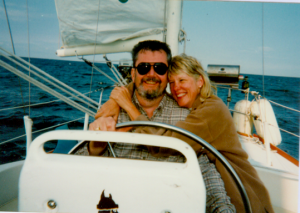by Karen Keller Capuciati
“Let’s enjoy this day.”
These are words from a man who was diagnosed with Alzheimer’s disease five years ago at the age of 60. After his diagnosis, Steve Hume resigned from his 30-year career as a behavioral healthcare executive and psycho-therapist. Quite suddenly, he and his life partner, Candy, realized that the life ahead of them would be very different from what they imagined. Over time they’ve learned to live in each day, and to accept and adapt to the changes in their lives.
Steve quickly gleaned that he would have to rebuild his life, which he did by becoming a full-time advocate for victims of the disease. Currently in his third year as a member of the Alzheimer’s Association’s national board of directors, Steve delivers speeches at conferences and fundraisers, and has testified in Washington DC on behalf of the association. After reading some of his speeches, particularly the one entitled, “I Am That Man,” I was eager to hear more from Dr. Hume.
We spoke on the phone in early April about what he’s learned so far and what he most wants to share with other people facing this disease. He was candid and thoughtful in his responses — a result, no doubt, of his many years as a therapist.
Here is a part of our conversation:
Q. In your “I Am That Man” speech, you speak of a “spark” that led you out of your despair. What was that like? How do you turn around the natural despondency that accompanies an Alzheimer’s diagnosis?
A. After being crushed by the diagnosis and its impact on my life, work and family, I thought, “Oh well, it’s over. I might as well sit and wait to die.” I experienced grief, anger, fear and despair. But I was able, maybe because of my profession, to process and work through all the garbage. I’m not sure what clicked. Maybe I just got bored and restless. I realized that Alzheimer’s will be a long and drawn-out process. I decided that I needed to do something. It’s my natural capacity to be active.
Q. What would you suggest a partner or caregiver do to help someone just diagnosed with Alzheimer’s?
A. I have a two-part answer for this. First, people need space to grieve, to feel and express feelings without someone jumping in to try and fix it. My suggestion is that a caregiver just listen and encourage the one they love to talk about things, at whatever rate they’re able. Now, if the person is still wallowing in sadness six months later, then maybe they need to seek professional help. In the meantime, the caregiver should start developing an action plan — what steps need to be taken, what resources are available, etc. — but allow space before flooding them with these details. Most likely, someone just diagnosed with AD does not want to hear about the nitty gritty right then, in the beginning. But do set up a plan and present it as it can be tolerated.
Secondly, a negotiation needs to take place between the caregiver and the person with AD that focuses on allowing the person with the disease to do what they can — and then a little more. This preserves their self-esteem and keeps them functional. It’s natural that caregivers feel protective. They don’t know if/when the person is going to fall off the cliff. We learned to take it week to week.
Q. You stated that your efforts with the Alzheimer’s Association gave you new meaning and purpose that literally saved your life. Being fully engaged in a meaningful way has clearly been critical to your well-being. What other ways of getting involved do you recommend for people facing AD?
A. I typically recommend finding a volunteer position, just in general, something that can provide a protective environment with more flexibility and with fewer demands. Volunteer work can be very meaningful to many people and allow them to stay involved in some way. But I also recommend pursuing hobbies. With work and family consuming most of our time, most of us haven’t had time to develop our hobbies. But finding something that is of interest, and practicing this pursuit with other people, is key. Isolation is linked to accelerated decline with Alzheimer’s disease.
Q. You spoke of your initial diagnosis and the shock it was to you and your loved ones. Now, five years after the shock, what would you tell someone who just received an AD diagnosis?
A. Personally and professionally, I would say that I’m sorry to hear about your diagnosis. I would let them know that their life will never be the same. I would urge them to express all the different emotions they’re feeling. Importantly, I would want them to know that, while there’s life beyond the diagnosis, they will need to rebuild their life.
Q. And what would you tell the caregiver after the initial diagnosis?
A. I would tell them that their life has changed forever, too. What you need to work on immediately is how to take care of yourself. Statistics on the well-being of caregivers are horrendous. If you haven’t been good at this, you need to learn to carve out time for yourself, socialize, maintain your health and get people into your life who can help you. Don’t wait to get started on this later, when you suddenly need it. You need to start these good habits for yourself now.
Just listen, give space, stay involved, take care of yourself — these are some of the life lessons Steve Hume has presented to us. And perhaps most importantly: Enjoy this day!







Thanks Karen you’re doing a great job